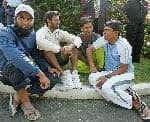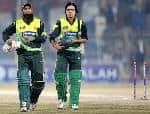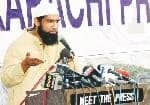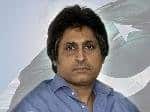Mohammad Yousuf Cricket Players
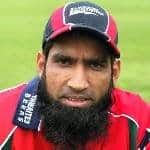
Mohammad Yousuf was born on 27th August 1974, Sargodha, Punjab, Pakistan. He is a former Pakistani right-handed batsman. He is best known in cricket for his achievement in 2006 when he broke the world record for most Test runs in a single calendar year. Prior to his conversion to Islam in 2005, Yousuf was one of only a few Christians to play for the Pakistan cricket team.
Yousuf was effectively banned from playing international cricket for Pakistan, for an indefinite period by the Pakistan Cricket Board on 10 March 2010, following an inquiry into the team’s defeat during the tour of Australia. An official statement was released by the Pakistan Cricket Board, saying that he would not be selected again on the grounds of inciting infighting within the team.
On 29 March 2010, Yousuf announced his retirement from all forms of international cricket, a direct reaction of the indefinite ban handed out to him by the PCB.
Career
He made his Test debut against South Africa at Durban and One Day International debut against Zimbabwe at Harare. He has scored over 9,000 One Day International runs at an average of 44.50 (2nd highest batting average among Pakistani batsmen after Zaheer Abbas) and over 7,000 Test runs at an average of 55.80 (highest batting average amongst all Pakistani batsmen) with 24 Test centuries. He has the record of scoring the most runs without being dismissed in the One Day International match, with a total of 405 runs against Zimbabwe in Zimbabwe in 2002-2003. He has also scored a 23-ball fifty and a 68-ball hundred in One Day International. In Test match, he has scored a 27-ball fifty, which is 3rd fastest by any player. He was the top scorer during the successive years of 2002 and 2003 in the world in One Day International match. In 2004, he scored 111 runs against the Australians in the Boxing Day Test. In December 2005, he scored 223 runs against England at Lahore, also earning him the man of the match award. Seven months later in July 2006, when Pakistan toured England, he scored 202 runs and 48 in the first Test, again earning himself the man of the match award. He followed up with 192 in the third Test at Headingley and 128 in the final Test at The Oval.
Yousuf was named CNN-IBN’s Cricketer of the Year for 2006, ahead of the likes of Australian captain Ricky Ponting, West Indies Brian Lara, Australian spinner Shane Warne, South Africa’s bowling spearhead Makhaya Ntini and Sri Lanka’s Muttiah Muralitharan. He was selected as a Wisden cricketer of the Year in the 2007 edition. Yousuf became the fourth recipient of the ICC ‘Test Cricketer of the Year’ award for 2007, he scored 944 runs at an average of 94.40 including seven centuries and two fifties in just 10 innings and that was enough to be awarded the honour ahead of English batsman Kevin Pietersen and Australian batsman Ricky Ponting. Yousuf was also named in the 2007 Test team of the Year alongside Pakistan Cricketer Mohammad Asif.
A year that started on a promising note, Yousuf carried it forward to break two world records both held earlier by former West Indian batsman Viv Richards. The 32-year-old, Pakistani batsman achieved an unparalleled 1788 runs in just 10 Test matches with the help of twelve centuries which became his second world record. Yousuf is known for his ability to score runs at exceptional rate through his great technique and composed strokeplay. Although capable of hitting the ball hard, Yousuf is quick between the wickets, although he is prone to being run out.
Yousuf is a skillful infielder, with a report prepared by Cricinfo in late 2005 showing that since the 1999 Cricket World Cup, he had effected the ninth highest number of run-outs in ODI cricket of any fieldsman. He is also distinguished by his characteristic celebration after hitting one hundred runs for his country, where he prostrates in thankfulness to Allah in the direction of Mecca. He has observed this act (known as the Sajdah) recently since his conversion to Islam.
On 11 August 2007 it was reported by The Dawn that Yousuf may join the Indian Cricket League and by joining the league he wouldn’t be able to play many matches for the Pakistan team. However on September 27, he changed his mind and signed a contract with the PCB, but nonetheless he missed the series against South Africa. He has been selected for the India tour in November 2007. In October 2007, Yousuf joined the Indian Premier League just few days after cancelling his contract with Indian Cricket League He was not signed by any IPL franchise as a result of his on-going court case with the ICL.
Yousuf informed the Pakistan Cricket Board that he would not be taking part in the Champions Trophy 2008 because it would coincide with the holy month of Ramadan.
Yousuf re-signed with the Indian Cricket League in November 2008. He was banned by the Pakistan Cricket Board on 5 November 2008 for joining the Indian Cricket League.
Yousuf ended his association with the unsanctioned Indian Cricket League (ICL) in early May, in the hope of earning a recall for his country. Pakistan recalled Yousuf to the squad for their 2009 Test series in Sri Lanka.
He along with another former Indian Cricket League player Abdul Razzaq were awarded ‘A’ category mid-term central contracts by Pakistan Cricket Board after they left Indian Cricket League. A little over one year after being welcomed back by the PCB, Yousuf was made captain of the Test team for the tour of New Zealand after Younus Khan was allowed to take a break.
The Pakistan Cricket Board, on 10 March 2010, banned Yousuf and former captain, Younis Khan from playing for the national team indefinitely and imposed one-year bans on Shoaib Malik and Rana Naved-ul-Hasan. Despite receiving the ban Yousuf said that the series against South Africa in late 2010 could be a possibility.
Statistics
Career highlights
An innings-by-innings breakdown of Yousuf’s Test match batting career, showing runs scored (red bars) and the average of the last ten innings (blue line).
* In November 2006, Yousuf achieved the 10th highest ever figure in ICC’s test batting rating. His rating of 933 gave him a personal best of 2nd place in the rankings behind Ricky Ponting and was the 3rd highest ranking of any current player as well as the highest for any batsmen from Asia.
* Yousuf is the third Pakistani batsmen to surpass 6000 runs in test cricket, the others being Javed Miandad and Inzamam-ul-Haq.
* He has the second highest Test Match centuries amongst Pakistani batsmen, currently on 24 and only 1 behind Inzamam-ul-Haq.
* With his twin hundreds in the Karachi test against West Indies 2006, Mohammad Yousuf became the sixth Pakistani and 30th cricketer in test cricket to hit a century in each innings of a test match.
* He is the third highest run scorer in One-Day Internationals amongst Pakistani batsmen. His average of 44.50 places second out of all Pakistani batsmen, following only Zaheer Abbas (47.62).
* His Test average of 54.86 currently puts him in 10th spot for Test batting averages for players with more than 50 appearances.
* He has scored a century at International level against all Test playing nations, and also on the shores of all test nations.
The following tables illustrate a summary of the Test and ODI centuries scored by Mohammad Yousuf.
* In the column Runs, * indicates being not out.
* The column title Match refers to the Match Number of his career.
Records
Test match records in 2006
Statistically, the year 2006 is said to be the year of Australia, Muttiah Muralitharan and Yousuf. Yousuf scored 1788 runs at an average of 99.88 in 2006 and broke two of Viv Richards’s world records.
* On 30 November 2006, during the third innings of the final Test between Pakistan and West Indies at Karachi, he surpassed Viv Richards’s thirty year old record and became the highest scorer in Test matches during a single calendar year. He also broke Zaheer Abbas’s record for the most runs made by a Pakistani batsman in a three-Test series. Abbas made 583 runs against the visiting Indians in 1978/79.
* Yousuf hit twelve centuries in 2006, which is a world record for most centuries in a calendar year.
* Yousuf also equalled the record held by former Australian batsman Donald Bradman, by scoring six centuries in successive Tests – although it took him only four matches compared with Bradman’s six.
* After his 191 at Multan he became the first player in Test history to have been dismissed 3 times in the 190s, with all three innings coming in 2006.
Awards
Yousuf was named the Test player of the year at the ICC Awards in 2007.
Early years
Yousuf hailed from a poor background and was plucked from the obscurity of a tailor’s shop in the slums of the eastern city of Lahore to play a local match in the 1990s. His well-crafted shots attracted attention and he rose through the ranks to become one of Pakistan’s best batsman.
Conversion to Islam
Until his conversion to Islam in 2005, and Joseph was Christian IV (and V is generally a non-Muslim) to play for the Pakistan cricket team, following in the footsteps of Wallis Mathias, Antao D’Souza and the Anglo-Pakistani Duncan Sharp. He also has the distinction of being the first and so far only non-Muslim country to the captain, and lead the team in the 2004-05 tour of Australia where he scored a century in the Boxing Day Test at the Melbourne Cricket Ground. He converted to Islam after attending meetings of the regular preaching of the Tablighi Jamaat, the largest in Pakistan, non-political religious gathering, which include former colleague preachers Yusuf Saeed Anwar and his brother. Conversion with his wife Tanya, and adopted the Muslim name Fatima. But were retained on the news especially for three months for family reasons, before announcing the transfer of publicly in September 2005. “I do not want to give my name is Joseph after what he did,” the newspaper quoted his mother as saying in the Daily Times. “We came to know his decision when he offered Friday prayers at a local mosque. It was a shock,” he told his mother she said. However, Joseph said, told the BBC that “I can not tell you what a wonderful feeling it is.” As part of his conversion, Yusuf officially change his name from Joseph to John Muhammad Yusuf.
Former Pakistan cricketer and sports commentator Rameez Raja, who himself is Muslim, acknowledged the significance of Yousuf’s new faith, “Religion has played an integral part in his growth not just as a cricketer but as a person.”
Cricket controversy
Indian Cricket League
In 2007, after initially signing a contract to join the Indian Cricket League, Yousuf later refused due to pressure from the Pakistan Cricket Board as he would later face a ban by the board. In return the PCB promised to get him into the Indian premier league, however, no team bid for him as he faced litigation from the ICL.
In 2008, he once again threatened to join the ICL after the PCB dropped him from their squad. A PCB official was quoted as saying, “We have banned all our cricketers who joined the ICL and if Yousuf also plays for the unauthorised league then he will have to face the same punishment. Yousuf is still our best Test batsman and has a future with the Pakistan team, but not if he joins the ICL. It will be game over for him if he joined the rebel league.” Yousuf decided to join the ICL again to play mid-way though the second season.[40] The Pakistan Cricket Board reacted to the news by banning Mohammad Yousuf from the national team after he rejoined the ICL. Yousaf’s chances to return to Pakistani cricket improved on February 2, 2009 when a Pakistani court suspended the ban on ICL players.
Pakistan have recalled batsman Mohammad Yousuf to the squad for their July 2009 Test series in Sri Lanka. Yousuf ended his association with the unsanctioned Indian Cricket League (ICL) in early May, in the hope of earning a recall for his country. His decision to join the ICL was made because of differences with former captain Shoaib Malik, who has since been replaced by Younus Khan. In July 2009, on his first match after returning to Test Cricket since 2007, Yousuf scored a century to announce his return to cricket.
Retirement
On 29 March 2010, Yousuf announced his retirement from all forms of international cricket, just days after the Pakistan Cricket Board imposed an indefinite ban on him. “I received a letter from the PCB that my staying in the team is harmful for the team, so I announce my retirement from international cricket,” he said at a press conference in Karachi. Earlier on 27 March, Yousuf said that he had decided to retire from international cricket. “Yes, I have decided to retire as Pakistan player and my decision is not an emotional one”, Yousuf told press agency AFP, “It’s of no use playing if my playing is harmful to the team”. He was handed over an indefinite ban by the Pakistan Cricket Board, a fortnight ago, for his disciplinary problems on the Pakistan’s tour of Australia 2009-2010.
Interview
Pakistan cricket has produced many great batsmen who have scored centuries when the chips were managed to see off lethal bowling spells in testing conditions and even managed to save matches for their country when it mattered the most.
Little Master Hanif Mohammad became the first true master batsman when he scored the first triple century in Test cricket for Pakistan against the West Indies in 1957-58. Zaheer Abbas, who scored runs at will, became the first Pakistani to score 100 first class centuries while Javed Miandad, who was the first Pakistani to score 20 or more centuries in Tests, remains the only player whose career batting average always remained above 50.
They all represented Pakistan with zeal and won many a match but even they couldn’t compare the talent of record-breaking sensation Mohammad Yousuf. Yousuf, who began his international career in 1998 as Yousuf Youhana, added one of the most prestigious record most runs in a calendar year to his cap when he scored 1,788 runs from January to December at an average of 99.33 and broke West Indian Sir Vivian Richards’s record of 1710 runs in a calendar year at 90, set 30 years ago in 1976. He also broke the world record of most centuries scored in a calendar year as he scored as many as nine in his 11 matches in 2006. Previously, Sri Lankan great Aravinda de Silva and West Indian legend Viv Richards jointly held the record of most centuries in a calendar year with seven centuries each.
Born on August 27, 1974 at Lahore to Christian parents as Yousuf Youhana, Yousuf was a stroke player from his early playing days and loved to collect runs more from running between the wickets than boundaries. His ability to remain calm and composed during crucial matches in Pakistan’s domestic cricket earned him his Test cap in 1998 when he was chosen to play against South Africa in Durban.
By donning the green Pakistani cap, he joined the elite list of non-Muslim cricketers Wallis Mathias, Duncan Sharpe, Antou D’ Souza and Anil Dalpat to play Test cricket for Pakistan but no one, not even Yousuf himself, would have thought what the future had in store for him. From 1998 to 2004, Yousuf continued to represent his country at the highest level piling up runs at will against all oppositions, be it the mighty Australians or minnows Bangladesh.
Since his debut, he has scored over 7,608 ODI runs in 228 matches at an average of 41.34 which is the third highest batting average among Pakistani batsmen after Zaheer Abbas (47.62) and Javed Miandad (41.70) and higher than the likes of Saeed Anwar (39.21) and Inzamam ul Haq (39.96). His 11 centuries in 228 matches are the second most by a Pakistani, after Saeed Anwar’s 20 in 247 matches. In Tests, his average is better than any other Pakistani, as his 6,402 Test runs came at an average of 56.65 whereas he shares the second place with Pakistan’s master batsman Javed Miandad. While Javed’s 23 centuries came in 123 matches, Yousuf managed his in just 73 matches, an amazing contrast!
He excels in both versions of the game, and holds a record as diverse as the world record to win the most games without being sent off in ODIs as he scored 405 against Zimbabwe in Zimbabwe before the World Cup 2003. 50 has a 27 ball in the tests against South Africa during the tour itself is faster 3 by any player while he was also an excellent fielder in all forms of cricket, and took 59 catches in the match test 73 and 50 during the catch [Addis 228 for him.
In 32, and Joseph is the mainstay of Pakistan cricket, bring down the aging Inzamam ul-Haq, who was the bone marrow to Pakistan in the past 10 years. Although the highest rate in all forms of cricket 141 not out in ODIs and 223 in the tests may not seem outstanding, for 23 centuries and 26 centuries and a half years in tests of the AH 11th and 51 centuries half in ODIs is nothing short of wonderful.
On a personal level, I was shocked Joseph Christian community along with the cricket world when he converted to Islam in 2005. As part of the conversion, he officially changed his name from Joseph to John Muhammad Yusuf, which is not heard, nor in cricket in any other sport.
As Youssef Mohammed, he started from where John Joseph had left in 2006 and ended on the rise, and put the world record for most Test runs by the batsman in one calendar year. He also scored the most centuries in consecutive matches, record bettering walk without Bradman for six centuries in as many games by scoring the same number of centuries in five matches, one less without a great game of cricket!
Came the last two of five centuries in a row test Karachi last month, played against the West Indies to visit where he became Pakistan’s fifth after Muhammad Hanif, Miandad Javed, Wajahatullah Wasti, Hamid Yasser and Inzamam sacred right to score 100 or more in each of the episodes of the same game.
Joseph also has shown signs of weakness, but unlike the others, is suspected to bigger problems. While there are many players who get pressure when they are in their 90s, and Joseph is the only one to be left out in the 190s, at least three times.
Missed double centuries on three occasions in the past two years, which proves his brilliance to the point of running even after crossing the 100 mark. That, even now, four centuries and scored a double in the tests, which is the second highest by any Pakistani, Javed Miandad also managed six!
If Joseph continues to play the way in which managed over the past 12 months, who knows Pakistan has to win the World Cup to be held in the Caribbean in April next year. It takes only one man to make a change during the year 2006, and Joseph made it clear that the difference.


